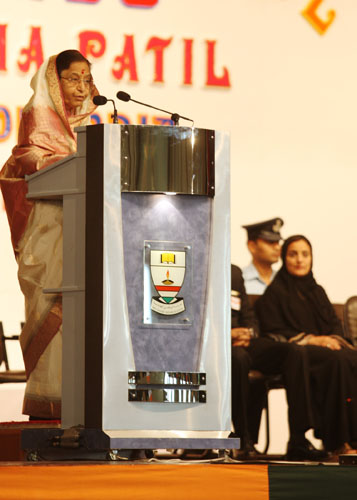Speech by Her Excellency the President of India, Shrimati Pratibha Devisingh Patil at the Abu Dhabi Indian School at Abu Dhabi, Uae
Abu Dhabi, Uae : 23.11.2010

Ladies and Gentlemen,
and Dear Students,
It is a great privilege to be here amongst the children of the Abu Dhabi Indian School and other schools who have assembled here.
I understand that the Abu Dhabi Indian School was started 35 years ago through the efforts of our present Vice President, Shri Hamid Ansari, with only three teachers and 53 elementary level pupils, has now grown into a leading community school, with more than 450 staff and 5000 students. The school has been preparing students for the CBSE examinations since 1983, and has been achieving commendable success in its academic performance. It is also heartening to know that the students of this School have been winning the Hamdan and Sharjah Awards, constituted by the rulers of the UAE, for excellence in education. My congratulations for these achievements.
The quest for knowledge has been a basic characteristic of Indian ethos from time immemorial. Our ancestors undertook in-depth studies of questions on metaphysics, philosophy, logic, religion, astronomy, grammar, mathematics, medicine and many other branches of human knowledge. The results of their research are available in our rich literature starting from the Rig Veda. Throughout the subsequent centuries, India adopted an outward-looking approach. This enabled its people to absorb the influences that came from outside the country. At the same time, the ideas, concepts and contribution to knowledge of India, went to places beyond the frontiers of India.
The quest for knowledge, however, is unending. Research for new discoveries must continue, as we cope with change and challenges of the contemporary age. This becomes all the more important as the world is moving forward rapidly and decisively into an era where societies and economies are incrementally based on knowledge. Our education system has the responsibility to adjust to the rapid changes, so that the youth are well prepared to meet the future with great confidence.
Schools, the basic units of an educational system, are where children spend the formative years of their lives. It is here, that the process of imparting knowledge begins. What children learn in school, leaves a lasting impression on their minds. In today's context, education should teach about the different aspects of human history, in a manner that students can draw lessons from the past. It should make students aware of their social and cultural milieu, so that they can contribute meaningfully to society. It should acquaint them with the marvels of science and technology, with its immense capacity to transform human lives, with a view to encouraging them to develop a scientific temper. Moreover, education should enable them to work intelligently and in a systematic manner. Hence, it is very necessary for schools to impart good education.
Knowledge without values, however, is incomplete. Concepts of peace, harmony and tolerance must be learned in school. It is a value system that makes you strong. True education would be one that moulds one's character to perform one's duties without fear or favour, and to observe ethics in one's conduct and behaviour. Gandhiji said, "Learning without courage is like a waxen statue, beautiful to look at but bound to melt at the least touch of a hot substance." An unwavering moral standard would liberate the mind from fear. Character formation should have equal priority with the knowledge of alphabet. Indeed, education without character is like a flower without fragrance. In Sanskrit we say "Vidya vinayen shobhate", which means knowledge, when accompanied by humility adds lustre to that learning.
Education should also help appreciate the underlying commonality of the future of the Earth and human life, families and communities, countries and regions. Hence, an essential objective of education must be to create individuals sensitive to their environment, and to the needs of fellow human beings. This will make them responsible inhabitants of the planet, enlightened citizens of their country with compassion towards others, especially those who are less privileged.
I have just seen the performances of your school, and I am impressed with the immense talent that there is in the school. I think you are fortunate to receive education in this school. I must congratulate the Principal, the teachers and students of the school, for the cultural performances. The performances were full of talent, were thrilling and beautiful. You must use your time to learn as much as you can, build friendships and develop the ability to work constructively as a team. The purpose of giving you education, is not merely to put you in a profession so that you live well, but it is an investment for the future. You are the future of India, and the leaders of tomorrow. My best wishes to you for a bright and successful future.
Thank You.
Jai Hind!








